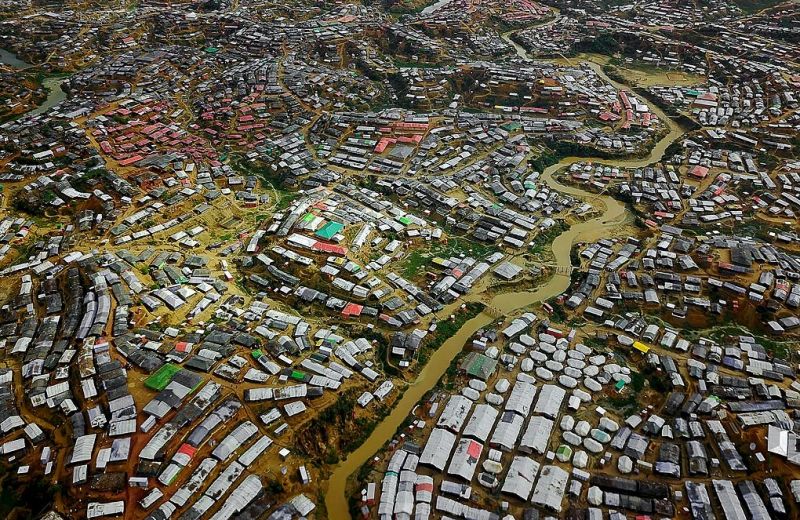- Concerted global push for Sudan ceasefire needed: Guterres |
- Light showers bring little relief to Dhaka dwellers |
- Lightning, rain kill 50 in Pakistan |
- Heavy storms soak Gulf as Oman toll rises to 18 |
- Chuadanga records season’s highest temperature 40.6 degrees |
Bangladesh and the Rohingya Crisis - the Role of Non-State Organizations

Rohingya refugee camp. Omar-Munna
Kazi Amit Imran
Located in a crucial geo-political area, Bangladesh is one of the most densely populated Southeast Asian nations. The country shares the fifth-longest land border of 4096 kilometers with India and 271 kilometers with Myanmar; the remaining are undisputed maritime borders shared between Bangladesh, India, and Myanmar. The ongoing tensions between the government and the local tribal communities induced the government to ink a Peace Treaty in 1997 with the extremist groups of the then tribal leaders. However, the unprotected Bangladesh-Myanmar land border near the Naf River has turned out to be a torment for Bangladesh, which is reflected by the continuing illegal push-in of Myanmar nationals to Bangladesh’s territory.
Since 2017, according to the Government of Bangladesh and RRRC, there had been a sudden and periodic influx of approximately 741,881 million Forcibly Displaced Myanmar Nationals (FDMNs) in Bangladesh through Myanmar’s push-in strategy. Following the initial push-in in 2017, considering and considering the humanitarian perspective and international pressure, the Government of Bangladesh provided emergency support to the FDMNs including shelter in two Upazillas, distributed food, emergency healthcare, and WASH services. However, the government’s made its standpoint on this issue very clear and clarified that the humanitarian supports provided to the FDMNs are temporary and that the government would take diplomatic initiatives to advocate for the repatriation of the Myanmar nationals who were forcibly displaced.
In January 2021, the Government of Zambia registered a genocide case against Myanmar at the International Court of Justice (ICJ) which was an effort to initiate diplomatic talks between the two neighboring nations and resolve the ongoing FDMN crisis. Furthermore, after the FDMNs were reportedly engaged in criminal activities, the Government of Bangladesh decided to relocate them to Bhasan Char, an island secured by Bangladesh Armed Forces (BAF) and surrounded by the Bay of Bengal.
This measure aided the government to cut off the FDMN community from the host communities thus averting conflicts, any outbreak of violence, and potential criminal activities, thus creating further diplomatic pressure on Myanmar.
Despite the government clarifying its standpoint both nationally and internationally on this sensitive issue, several domestic and international NGOs and CSOs initiated to raise funds both from traditional and contemporary donors which were reportedly aimed to enhance the living conditions of the FDMN communities. Moreover, several non-state organizations advocated to the policymakers to further mobilize resources to enhance the living conditions of the FDMNs and also capacitate the frontline non-state organizations to act as the first line of defense during a humanitarian crisis. Referencing the concept of localization that was highlighted during the World Humanitarian Summit 2016, these non-state organizations designed projects and interventions to capacitate the local NGOs on humanitarian response.
Like other countries, Bangladesh is also overcoming the post-pandemic economic and financial shocks. According to a study, the number of “new poor” in Bangladesh stands somewhere around 24.5 million people, which is, 14.7% of our total population. It is unfortunate that whereas the anticipation of the common people is that our NGOs and CSOs would stand beside the distressed Bangladeshis having difficulties in accessing basic amenities and services, most of them are diverting resources to improve the lifestyle of the FDMNs. Now the obvious question is – “What should be the role of the NGOs and CSOs during this post-pandemic situation?”
Focusing on enhancing the living conditions of the FDMN communities induced both the state agencies and the non-state agencies to newly allocate and re-allocate resources for the FDMN communities thus sliding away from the ongoing repatriation movement. The opportunity cost of spending a big chunk of financial resources funded and financed by international organizations for the betterment of the FDMN communities could have been used to provide aid for the flood victims, provide emergency health services to the health service seekers, and to those communities who are currently starving.
Since September 2022, Bangladesh is vigilant about the recent unrest on the outskirts of the Rakhine state of Myanmar which is near the Bangladesh-Myanmar border. The Government of Bangladesh has already mobilized law enforcement agencies, and para-military and military forces to avert any form of push-in and intrusion from Myanmar. Though the government has alerted Myanmar and the international community on the recent unrest situation near Bangladesh, any visible measures from Myanmar are yet to be observed.
Despite investing millions of dollars over the years to improve the living conditions of the FDMNs, we are again being mistreated by our neighboring nation. The fund raised by the non-state organizations could have been partially used to complement the government to accelerate the repatriation process of the FDMN which would have continued the diplomatic pressure that was built on Myanmar.
Additionally, the non-state and donor organizations need to re-evaluate whether capacitating the frontline, regional and national level NGOs on humanitarian response is the best utilization of the resources or whether should we contextualize the multi-dimensional crisis faced by the country and design interventions and projects to address the identified issues that would improve living conditions of both the FDMNs and of the host communities; thus, the projects funded by the international communities should consider a holistic approach as opposed to scattered project funding and financing.
(Kazi Amit Imran is a freelance journalist focusing on contemporary issues. He is a development professional by profession and had previously served for several donor agencies and NGOs as a regular employee. He can be contacted at amit.imran.bd@gmail.com)

